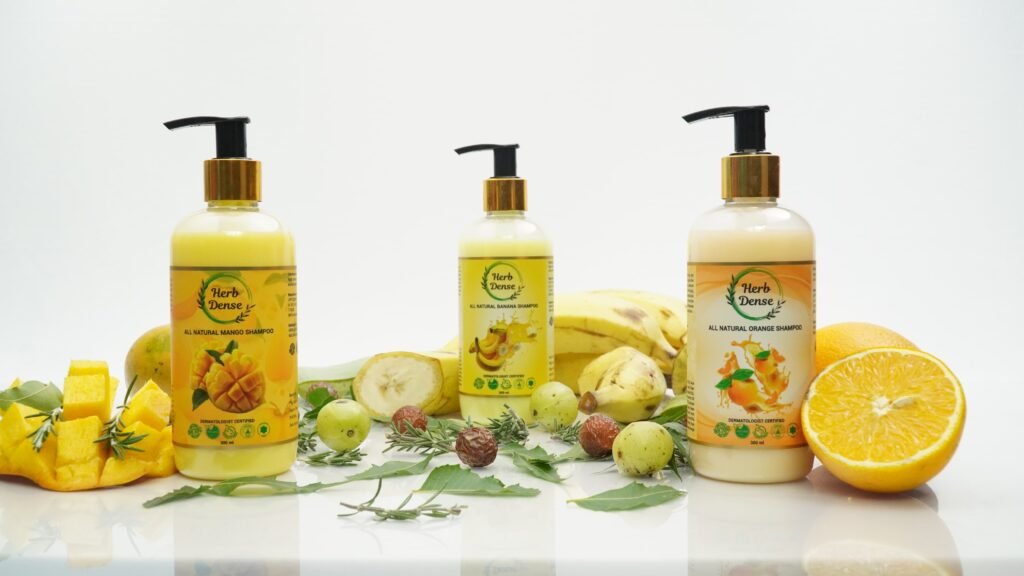In a world obsessed with anti-aging remedies and youth-enhancing products, the notion that something as simple as a herbal shampoo could turn back the clock might seem too good to be true. However, with the rising popularity of natural and organic beauty products, many people are turning to herbal shampoos in the hope of achieving a younger, more vibrant appearance. But can these shampoos really make you look younger, or is it all just marketing hype? Let’s dive into the science, ingredients, and claims to uncover the truth.
Understanding Hair and Aging
Hair is one of the most visible signs of aging. As we grow older, our hair undergoes several changes:
- Graying: The loss of pigment in hair follicles leads to gray or white hair.
- Thinning: Hair density decreases as follicles shrink, resulting in thinner, more fragile strands.
- Dryness and Brittleness: Reduced oil production in the scalp can make hair dry and prone to breakage.
- Dullness: Aging hair often lacks the shine and vibrancy of youth.
These changes can significantly impact how youthful we look. While hair dye and styling products can mask some of these signs, many people seek holistic and natural solutions to improve their hair’s health and appearance from within.
What Are Herbal Shampoos?
Herbal shampoos are made from plant-based ingredients, often free from harsh chemicals like sulfates, parabens, and silicones. They typically include natural extracts, oils, and botanicals known for their beneficial properties. Common ingredients in herbal shampoos include:
- Aloe Vera: Known for its moisturizing and soothing properties.
- Neem: Renowned for its antibacterial and anti-inflammatory effects.
- Hibiscus: Promotes hair growth and combats dryness.
- Amla (Indian Gooseberry): Rich in Vitamin C, it strengthens hair and prevents graying.
- Fenugreek: Improves scalp health and adds shine.
- Green Tea: Contains antioxidants that protect against damage and aging.
Claims of Herbal Shampoos
Manufacturers of herbal shampoos often make bold claims, such as:
- Restoring natural hair color.
- Boosting hair growth and volume.
- Reversing damage and improving texture.
- Enhancing shine and softness for a youthful look.
While these claims are appealing, it’s important to evaluate them critically. Can a shampoo really deliver such transformative results?
The Science Behind Herbal Shampoos
The effectiveness of herbal shampoos depends on their ingredients and how they interact with your hair and scalp. Here are some ways in which these shampoos might contribute to a younger appearance:
- Improved Scalp Health: Ingredients like neem and tea tree oil can combat dandruff and irritation, promoting a healthier scalp, which is the foundation for vibrant hair.
- Strengthening Hair: Botanicals such as amla and hibiscus can nourish hair follicles, reducing breakage and thinning over time.
- Enhancing Shine: Natural oils and plant extracts can restore moisture, giving hair a glossy, youthful look.
- Antioxidant Protection: Ingredients like green tea and rosemary are rich in antioxidants that protect hair from environmental damage and oxidative stress, which are major contributors to aging.
Limitations of Herbal Shampoos
While herbal shampoos have their benefits, they are not magic potions. Here are some limitations:
- Superficial Changes: Shampoos work on the surface and have limited ability to affect deeper biological processes like graying or follicle shrinkage.
- Consistency Is Key: Results often require long-term and consistent use, which may not be ideal for those seeking quick fixes.
- Individual Variability: Not all ingredients work for everyone. Hair type, scalp condition, and genetics play significant roles in determining effectiveness.
Tips for Choosing the Right Herbal Shampoo
If you’re considering trying a herbal shampoo to achieve a younger look, keep the following tips in mind:
- Read the Ingredients: Look for shampoos with high concentrations of active botanicals.
- Avoid Harsh Additives: Ensure the product is free from sulfates, parabens, and artificial fragrances.
- Match to Your Needs: Choose a shampoo tailored to your specific hair concerns, such as dryness, thinning, or dandruff.
- Patch Test: Test the product on a small area of skin to avoid allergic reactions.
Holistic Hair Care for Youthful Looks
While herbal shampoos can be a valuable part of your hair care routine, they work best when combined with other practices:
- Healthy Diet: Nutrient-rich foods, especially those high in protein, biotin, and omega-3 fatty acids, are essential for hair health.
- Regular Trims: Prevent split ends and keep hair looking neat and healthy.
- Scalp Massages: Stimulate blood circulation to the scalp with regular massages using natural oils like coconut or argan oil.
- Stress Management: Chronic stress can accelerate hair aging. Practices like yoga, meditation, and exercise can help.
The Verdict
Can a herbal shampoo really make you look younger? The answer lies somewhere in the middle. While these shampoos can improve hair’s texture, shine, and overall health—giving the appearance of youth—they are not a miracle solution for reversing aging. Their effectiveness largely depends on the quality of ingredients, your individual hair type, and how consistently you use them.
Ultimately, maintaining youthful hair is a combination of using the right products, following a healthy lifestyle, and embracing a holistic approach to hair care. Herbal shampoos can be a valuable tool in your arsenal, but they should be part of a broader strategy rather than a standalone solution.

